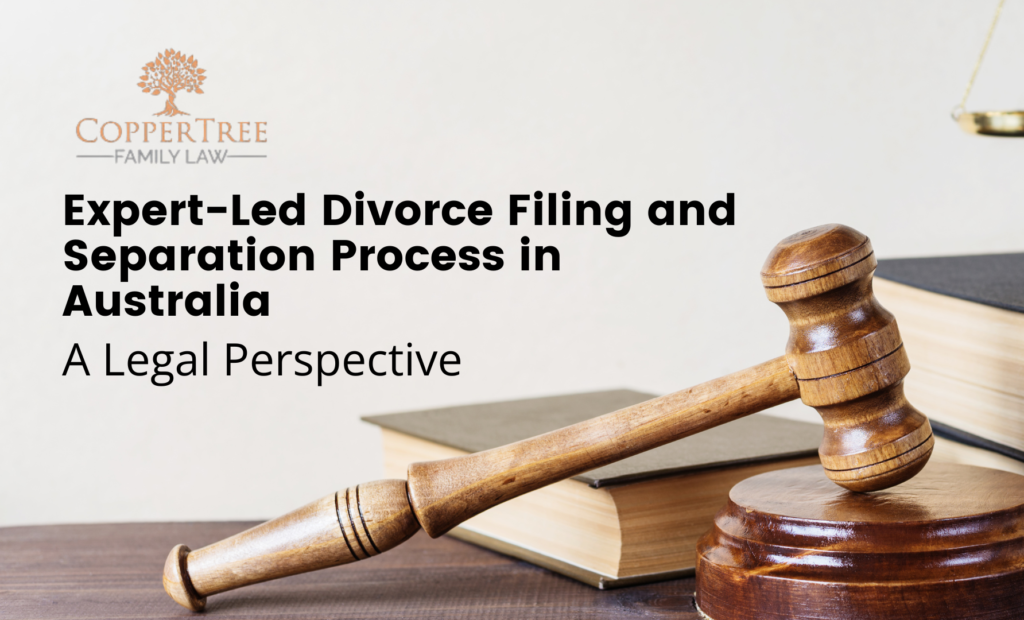
Divorce and separation are difficult life events that often come with emotional, financial, and legal challenges. Understanding the legal process of divorce in Australia, especially the requirements under the Family Law Act 1975, is crucial for individuals seeking to move forward. This article provides a comprehensive guide to the divorce process, including key steps, legal obligations, and considerations to help you navigate the system efficiently and effectively. If you are in a de facto relationship, then different considerations apply and this will be dealt with in a subsequent paper. However, it is important to note that property settlements must be completed within two years of separation.
Introduction: Understanding Divorce and Separation in Australia
In Australia, divorce and separation are governed by the Family Law Act 1975, which provides the legal framework for family-related matters, including marriage dissolution, child custody (parenting arrangements), and property settlement. Australia operates under a no-fault divorce system, meaning that the court does not require one party to prove the other’s fault (such as adultery or cruelty) to obtain a divorce. Instead, the only ground for divorce is the irretrievable breakdown of the marriage, which is typically established by living separately for at least 12 months.
Divorce can be a complex and emotional process, but understanding the steps involved can help make the transition smoother.

Step 1: Meeting the Legal Requirements for Divorce
Before you can apply for a divorce, you must meet certain legal requirements under Australian family law to be eligible to apply for divorce in Australia:
To apply for divorce in Australia, you must meet certain residency or citizenship requirements. You need to either:
- Regard Australia as your home and intend to live indefinitely in Australia;
- Be an Australian citizen by birth or descent;
- Be an Australian citizen by grant of Australian citizenship; or
- Ordinarily live in Australia and has done so for 12 months immediately before filing the application.
If you or your spouse are living overseas, there are additional requirements for applying from abroad if you meet the above criteria.
Has your marriage broken down and there is no reasonable likelihood that you will get back together? Only one of you need regard the marriage as over on the date of separation and in some way have communicated this to your spouse.
Living Separately for at Least 12 Months and 1 Day: This does not necessarily mean physical separation. In some cases, couples may be able to live under the same roof while maintaining separate lives, which is referred to as separation under one roof. However, this can complicate the divorce process, and you may need to provide evidence that your separation is genuine.
Step 2: Filing for Divorce
Once you meet the legal requirements, you can file for divorce.

Applying for Divorce through the Federal Circuit and Family Court of Australia: Divorce applications are processed through the Federal Circuit and Family Court of Australia (FCFCOA). You will need to submit an Application for Divorce, which can be done online.
Individual vs. Joint Applications: A divorce application can be filed either individually or jointly. If both parties agree on the divorce, a joint application is simpler and usually faster. However, if there is any disagreement, an individual application is required, and the other party will be notified of the application through service of the application on them.
Relevant Forms and Documents: The main document you need to file is the Application for Divorce form. You will also need to provide supporting documents, such as A marriage certificate
Step 3: Serving Divorce Papers

Once your divorce application is filed, you are required to serve the divorce papers on your spouse.
This is a legal requirement, and failure to properly serve the divorce documents can delay the process.
Serving the Divorce Papers: You or your lawyer must ensure that the other party receives the divorce application. This is typically done through personal service (handing the documents directly to your spouse), but in certain cases, other methods may be approved by the court.
Serving Domestic and International Situations: If your spouse is living overseas, additional steps must be taken to serve the divorce papers. International service can be more complicated, and you may need to seek guidance on the proper procedure.
Affidavit of Service: Once the papers have been served, you must file an Affidavit of Service, which is a sworn statement confirming that your spouse has received the divorce application.
Step 4: Attending Court Hearings (if required)

In certain situations, your attendance at the hearing may be required:
When a Court Appearance is Necessary: If there are children under the age of 18 or if ther
e are contested matters (e.g., disagreements about the date of separation).
Confirming Arrangements for Children: The court will focus on ensuring that there are appropriate arrangements in place for any children of the marriage under the age of 18 years.
Contested Divorce Matters: If there are disagreements regarding the divorce, such as one party contesting the application, you may need to attend a hearing to resolve the matter.
Step 5: Finalizing the Divorce

Once the court has considered your divorce application, the next step is finalising the divorce:
Waiting Period After Divorce Hearing: If everything is in order and the divorce is granted, the court will issue a Divorce Order. There is a mandatory one-month andone day waiting period from the date of the hearing before the divorce is legally final.
Issuance of Divorce Order: After the waiting period, the court will issue the official Divorce Order, and the marriage is legally dissolved. The divorce becomes final one month and one day after the Divorce Order is issued.
Legal Separation Without Divorce
It’s important to note that separation and divorce are not the same under Australian law. Couples can be separated for years before applying for a divorce, and legal separation does not automatically result in the dissolution of the marriage.
Property Settlements: After separation, married couples may choose to resolve their property settlements in a timely manner, but there are time limits for doing so once a divorce has been granted. You must apply for a property settlement within 12 months of your divorce becoming final.
Parenting Arrangements: Parenting arrangements can be made at any time, and it would be prudent to obtain some legal advice as to whether legally enforceable orders suit your circumstances.
Financial and Property Settlement After Divorce

Once a divorce is finalised, the division of assets becomes a priority.
Division of Assets: In Australia, assets are divided based on a just and equitable principle, which means that the court considers both parties’ financial contributions as well as non-financial contributions (such as homemaking and child-rearing).
Formal Orders : It’s crucial to have your financial settlement formally documented in orders.
Superannuation Splitting: Superannuation (retirement savings) is considered a part of the property pool and may need to be divided between the parties.
Child Custody and Parenting Arrangements

When children are involved, the court’s primary focus is the best interests of the child.
Best Interests of the Child: The Family Law Act guides courts in making decisions based on what is in the best interests of the child, including considerations such as safety, emotional well-being, and the child’s relationship with both parents.
Importance of Legal Assistance in Divorce
Navigating the complexities of divorce law can be daunting. Having an experienced family lawyer by your side is crucial in ensuring that your rights are protected and that you are compliant with all legal obligations.
Family Lawyers can assist with divorce applications, parenting arrangements, property settlements; including superannuation splitting. They can provide guidance throughout the entire process and represent your interests in court if necessary.
Divorce Lawyers and Family Law Solicitors specialize in these matters and can help you avoid costly mistakes, ensuring that all aspects of your divorce and post-divorce arrangements are handled professionally.
Conclusion
Divorce is a significant life event, and understanding the legal requirements and steps involved is essential. From meeting eligibility criteria to finalizing property settlements and parenting arrangements, the divorce process in Australia can be complex. Seeking professional legal assistance from experienced Family Lawyers Central Coast can make a difference in ensuring a smooth process and protecting your rights.
Frequently Asked Questions
You must live separately and for at least 12 months before applying for a divorce. If you’re living under the same roof but separated, additional proof may be required. Our Family Lawyers Central Coast can assist with this process.
Yes, you can file for divorce without a lawyer, but legal advice is recommended, especially if there are children or property disputes. Moreover, our divorce lawyers can guide you through the process to ensure everything is handled correctly.
You’ll need an Application for Divorce, marriage certificate, and details of any children under 18.
If your spouse disagrees, you can still proceed with the divorce under Australia’s no-fault system provided you meet the requirements for a court to grant the divorce. Our Lawyers Central Coast can assist in serving the divorce papers and handling contested matters.
Property is divided based on a just and equitable principle, considering both financial and non-financial contributions.








